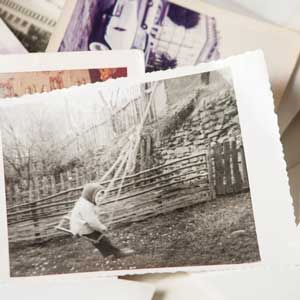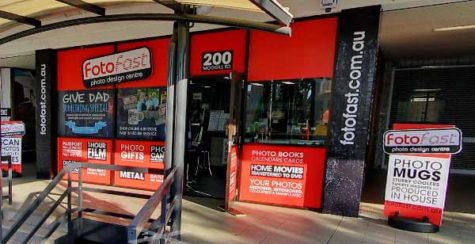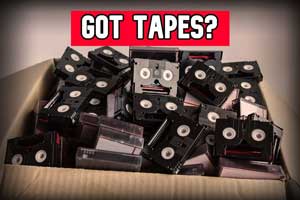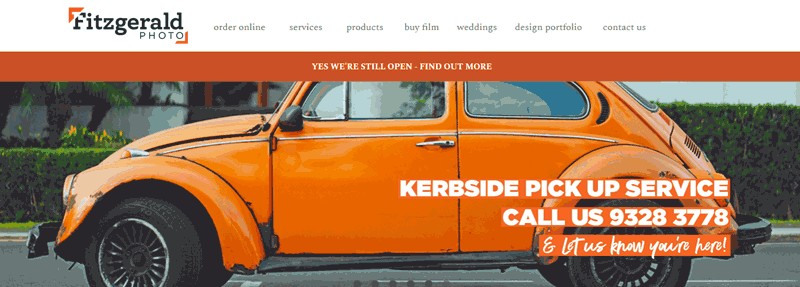Inside Imaging has held off putting together the ‘The Lockdown and Photo Retailing’ story until now, partly because we thought the fast-moving situation needed to settle down a little, partly because we didn’t want to bother people struggling with a massive (we have banned the word ‘unprecendented’) disruption to their businesses and lives, and partly because we didn’t want to report on the misfortune of friends and associates we have known in many cases for decades.
But we didn’t factor in just how damned tough and resilient those still running a photo retailing business in Australia actually are! They would excel in any form of retailing business, but their hearts are in this one. Photo retailing has been a tough gig for a long time, but nowhere has it been tougher than in Australia. The ranks of the specialist photo retailer have been thinned to the extent they are an endangered species, but with survivors like these, extinction ain’t going to happen to this generation.
Here’s why our specialist channel is so tough: Around the world, for over a decade now, businesses specialising in selling cameras gear and printing photographs have been smashed by: big box movers who moved in when digital cameras temporarily became a mass market; increasingly capable picture-taking smartphones; and the ability for people to view and share their photos on screens and the internet.
But Australian retailers also had to contend with their largest consummables supplier, Fujifilm, throwing its lot in with the likes of Harvey Norman and Big W, at the expense of its long-standing and loyal specialist customers. At the expense of the industry it was responsible for leading.
Kodak Alaris, in its increasing cluelessness blindly followed suit. To do otherwise would have required imagination and maybe even a little courage. As a result, to this day, we have the lowest print prices in the world. Specialist retailers have complained since the first Fujifilm Frontiers were installed on generous terms in Harvey Norman outlets, that the price they pay for paper and chemistry or ink from Fujifilm is way more than HN and Big W charge for a print. Then add wages and rent – both among the highest in the world.
So, highest overheads in the world and lowest print prices. For instance, the standard price of a 6×4 from Hardly’s, printed with Fujfilm equipment and consumables, is 10 cents for a single print. That’s around US$0.06 cents! By comparison, giant US retailer Walmarts charges US$0.25 cents – or A$0.38 cents (no GST) for a minimum order of 75 6×4-inch prints. Over in the UK, Boots charges 15 pence, or A$0.28 cents.
When operating on margins of a few cents or so, this has made the difference between specialist photo retailers being able to compete in what used to be their staple business, or losing money on every customer order. Then there are the regular promotions, particularly from Harvey Norman, when prints are marked down to a ridiculous 5 or 8 cents to lure bargain-hunters into the store, where they might also buy something which actually makes a profit.
This has more than decimated the specialist sector – dozens, or more like hundreds, of photo specialists around Australia have shut their doors over the last 10 – 15 years. As a keen observer of the photo specialist channel, I would say at least two-thirds are no longer operating, with the vast majority not even able to sell on what in many cases was a life’s investment – all so Fujifilm could protect its market share of photo printing consumables and the big retailers could generate store traffic. It’s a shameful narrative.
The low base prices have also had a knock-on effect on prolabs, who start to look too expensive when the fact is the mass merchants’ prices are too cheap. They drag photography down to a commodity. The market has been bent our of shape by unbreachable equipment and paper price differentials between different categories of Fujifilm (and Kodak Alaris) customers. It didn’t have to be this way.
But it has made those still standing in photo retailing incredibly resilient, able to withstand whatever slings and arrows are fired at them. So instead of the Coronavirus shutdown being the last nail in the coffin, it’s just another challenge for the hardy souls who run our wiry specialist photo channel. Please support them where you can.
…Forgive the long-winded introduction, but some historical context is essential. Here are some ‘reports from the field’ from retailers around the country – both hardware specialists and others focussing on the print services side:
Paul Rogers, general manager, Camera House:
We had mixed results over March and April and to be honest comparisons to last year are very challenging. We’re pleased to report that May is more encouraging for sales across all stores.
 We have changed many elements of our website fullfilment process with free delivery continuing and using the stores to supply stock directly to consumers locally where possible. We have conducted many more Zoom/Teams meetings, with stores and suppliers combining for training and product updates. Raleru also spent considerable efforts working with stores on understanding and accessing government stimulus measures. This was essential for stores in navigating their way through survival. Stores sharing experiences was also a key activity. Advertising that stores were available for telephone enquires also worked well. Our stores focussed heavily on local community engagement strategies via social media.
We have changed many elements of our website fullfilment process with free delivery continuing and using the stores to supply stock directly to consumers locally where possible. We have conducted many more Zoom/Teams meetings, with stores and suppliers combining for training and product updates. Raleru also spent considerable efforts working with stores on understanding and accessing government stimulus measures. This was essential for stores in navigating their way through survival. Stores sharing experiences was also a key activity. Advertising that stores were available for telephone enquires also worked well. Our stores focussed heavily on local community engagement strategies via social media.
Our Camera House website and supporting processes were pretty robust to start with. But websites are like painting the Harbour Bridge – never finished!
We have certainly seen increases in print and other services. Digitisation of analog media, restoration services and film have all seen marked increases.
Ninety percent of all Camera House stores remained open throughout the tricky March/April period. This shows the tenacity and entrepreneurial nature of independently-owned retailers. It has become obvious that photography has benefited in some ways from the lockdown, with folks having more time at home and the opportunity to ‘dig out’ their old cameras. We have seen increases in things like batteries, lens caps, cables, chargers, etc, as people have fired up old cameras from their cupboards. Suppliers have been fantastic throughout this period and we have worked collaboratively through these unfathomable times. Next important time will be seeing domestic tourism increase as we hopefully continue the recovery. Seventy percent of camera purchases are considered because of travel, so this is vital.
Alan Logue, Hutt St Photos, Adelaide:
Hmmm, where do I start! Overall, our sales are up – way up!
 As soon as the Covid 19 issue started, we did a new series of radio ads promoting staying at home, and sorting out your memories – and it worked! We have a mountain of slides, videos and Super 8 films to copy, and we are now running all our 3 Kodak PS50 scanners with all the photo scanning.
As soon as the Covid 19 issue started, we did a new series of radio ads promoting staying at home, and sorting out your memories – and it worked! We have a mountain of slides, videos and Super 8 films to copy, and we are now running all our 3 Kodak PS50 scanners with all the photo scanning.
We’ve had orders from Tasmania, NSW and Queensland shipped over to us to be scanned – the biggest was two big boxes with over 17,000 photos, negs and slides in it.
We were extremely lucky in South Australia that we did not have a shutdown imposed on us. We changed our hours from 8.30 to 6pm to 9am to 5pm and prepared for the drop in sales. Two weeks later, we went to 5.30 closing and increased staff hours.
Our film processing has gone off its head, and 70 percent of the film is scanned and Dropboxed. We now ask the customers if they want their negs back, and about 40 percent of them don’t want them – so we save on unrequired packaging.
All our service times for large jobs have been extended – not because of less staff, but because of increased demand.
We were on a strong growth trend in the first quarter, and whilst the pandemic has had an effect, it’s been positive rather than negative. I see our growth trend continuing for the rest of the year.
Catherine (Alan’s partner, who also operates a training business, Training for Learning) lost ALL her income from the SA Universities when it started, so the additional sales we are getting in the photo shop are helping to make up for her income drop. She is, however, now set up at home for photo scanning and video transfers and that takes some of the heat off the shop while we try to get through the processing.
Online has grown, but not as dramatically as I expected. Our only online offering is prints, canvas and photobooks, and whilst they have grown, it’s not huge.
While I would love the government to pay my staff wages for a few months, I’m proud to say that we have not had to fall back on the JobKeeper allowance, and I’m sure others are far more worthy of it with some of the businesses I’ve seen around us in Hutt Street.
We realigned most of our loans and leases at the beginning, as we feared the worst. Our landlord was also fantastic. But the doom and gloom expected in the shop did not materialise, and I’m looking forward to the next few months. As long as we don’t have the second infection problem, I see a very rosy picture. If we do get hit with the second infection, I believe we are well placed to ride it out.
My biggest problem at the beginning was trying to sort through all the information I was being bombarded with – from the Feds and the State government, plus the Adelaide City Council. There seemed to be conflicting messages, as well as statements followed by no additional information. Catherine and I both felt lost (probably like a lot of others) and I have to say I really didn’t know what to do or where to go for a few days. I put our trust in our accountant and he came through – he was able to sort through the BS and give us the info we needed. We also joined Family Business Australia – and they too had some great information for us.
I suspect it will be a rough road ahead, but I’m convinced we will ‘cross the bridge’ and come out on the other side better than when we started.
Phil Gresham, Fotofast, Brisbane:
Like Alan in SA we too had to review how we were doing business. Late March we dropped our business hours Monday – Saturday to 10-4. That worked until mid-April through locked doors with no customer direct access. Lots of signage around the exterior of the store explaining how we were working during CV. We already had an after-hours front door slot for film; we doubled the size of that and work came in and out that way, and larger orders could be left on the camping table outside. We also installed an intercom. Customers appreciated that we were still there with positive reactions.
 We applied for and started paying JobKeeper as soon as it was announced. We stepped up social media especially Instagram #fotofastfilm, a bit to Facebook and email blasts. Mother’s Day was the best in five years and online, especially printing and posters, has increased. We ship all over Australia benefitting from being online over 20 years and offering a faster service than most.
We applied for and started paying JobKeeper as soon as it was announced. We stepped up social media especially Instagram #fotofastfilm, a bit to Facebook and email blasts. Mother’s Day was the best in five years and online, especially printing and posters, has increased. We ship all over Australia benefitting from being online over 20 years and offering a faster service than most.
Mid-April we opened the door allowing one customer in the store at a time, closed door was such a hassle. We have all the social distancing and staff health measures in place, a large camping table across the counter and X marks outside the door for waiting customers. We purchased or obtained a number of extra VCRs and video cameras, using four iMacs/Macbook Pros, as we convert everything to MP4 these days. What is a CD/DVD 
Seven weeks from the start of ‘lockdown’ we have decided to keep opening hours to 10-4, realising that we are a destination store first and foremost. Staff work an extra 1.5/2hrs with the increased workload outside of opening hours, and we have decided to take on an extra staff member. JobKeeper started but stopped as we realised that we were 50 percent over the amount required to participate.
We are positive about the future. The young film shooters and the baby boomers have not stopped spending, but we are prepared for a slow down if it comes.
John Ralph, John Ralph’s Camera House, Erina:
Currently business is picking up. March showed the first two weeks as a scramble to clear stock at any cost then a serious slowdown as the lockdowns took place with the month ending at 27 percent down. April slowed significantly ending 40 percent down (was actually 55 percent down on same month in 2017 and 2018 due to election announcement last year.) This month, as the lockdown eases, the turnover is similar to last year as the hardware buyers reappear.

Passport photos are running around 25 percent of normal, which flows on to travel sales. Recent figures show Compact System (mirrorless) around fours times DSLR in dollar terms.
We responded initially by trying to sell as much as possible to get cash in. We reduced the number of staff working and hours open (from 59 hours down to 45 hours). We maintained promotion in social media and on radio, concentrating on profitable areas – lab and accessories. Stock is now down 20 percent on previous normal level.
As the JobKeeper program was announced we resumed normal hours (except Thursday night) and had staff on about 80 – 100 percent of normal hours. We initially used the extra staffing to ‘spring clean’ the store.
When it comes to our online channel, we rely on the Camera House website for sales and pricing. There have been some bugs in the system but generally it’s filled the gap for us. It has been important in addition to have a constant social media presence generated from the store to take advantage of selected profitable areas.
Bright spots include slide scanning, which this month is already at twice the monthly average (so four times normal). We are using the extra lab personnel created with JobKeeper to help people digitise their slide collections. Tapes and movies are also featuring. We generally have five DVD burners running during the day. Many people are responding to special offers such as ‘pay for one, get one free’ promoted on social media. Film processing is also strong.
Sales of microphones, webcams, LED lights and tripods are well up as people set up their home broadcast areas.
At this stage we are maintaining social distancing, hand sanitising, plenty of cleaning. Promotion is concentrating on the lab – in particular slide scanning and tapes to DVD. We promote our specialty camera message for those after batteries, chargers and the many accessories, rather than a new camera at this time. We hope to recommence lessons and workshops next month as restrictions ease.
And we will tend to be more cautious with purchasing and inventory levels as the situation unfolds.
Paul Maietta, Fitzgerald Photo, Perth
‘It’s been ok,’ Fitzgerald Photo managing director Paul Maietta told Inside Imaging. ‘ We’ve been fortunate in that we could trade through the lockdown. But we had to cut staff hours as there was an immediate and devastating hit to turnover. The government support was good.’
 Initially, Fitzgerald Photo reduced hours and wages by 50 percent, but JobKeeper then came to the rescue. ‘JobKeeper has allowed us to move up to 4 days a week. To be fair, we decided not to discriminate between those employees who qualified and those who for whatever reason didn’t,’ he explained.
Initially, Fitzgerald Photo reduced hours and wages by 50 percent, but JobKeeper then came to the rescue. ‘JobKeeper has allowed us to move up to 4 days a week. To be fair, we decided not to discriminate between those employees who qualified and those who for whatever reason didn’t,’ he explained.
‘Staff have been fantastic. Some were aware of looming problems before it hit, so we were kind of getting prepared early, making sure we had sufficient stock and the like.’
Like others above, Paul said trying to understand the changing rules on what was permitted in running a business, especially the HR aspects ‘was a nightmare’, with hours being consumed on a daily basis simply trying to keep up with the changing and sometimes contradictory instructions and rules.
While Paul said ‘online was fantastic for us’, it’s mainly been a case of existing customers switching to online ordering, rather than an overall increase in work, and that the average value of orders has suffered with lost foot traffic. This underscored the value of having customers engage with consultants in store. ‘The average dollar value of orders online is a lot less than via personal consultation – it’s a case of having people in the showroom for big ticket sales.
‘That hasn’t been possible with the 1.5 metre distancing rules,’ he explained. This leads to the conclusion that in Fitzgerald’s business model, at least, all the clever ‘virtual’ cross-selling and upselling techniques used on an transactional website aren’t a substitute for face-to-face communication with a highly skilled and engaging consultant in-store. ‘The back and forth communication alone online would take days online,’ he explained.
‘Nonetheless our online channel has been extremely capable. The Dakis (photo services software) platform works well and we extracted as much from it as we could.’
He said that customers have found it easy to switch to online transactions, and along with online ordering, ‘deliveries and curbside pickup went stupid.’
The lockdown also prompted Fitzgerald Photo to pay a bit more attention to its social media strategy.
‘We’ve probably been a bit lazy in the past as we didn’t need it, but as soon as we hit social media it worked straight away. People were at home and paying attention to social media and it worked really well.
‘Our staff worked it through. With some excess capacity we wrote up a list of what we could do, and from that we put together a social media marketing plan.
Lockdown-specific highlights included scans and film processing. While film processing was initially down overall, there were lots of forgotten ‘back-of-the-drawer’ rolls sent in for processing as people were doing major spring cleans during their enforced breaks. Paul also noted that film processing is slowly coming back as the ‘young hipster’ film photography demographic working in catering and hospitality and the arts start getting out and about again.
Scanning has been way up. ‘One guy came in with a full suitcase of prints he needed scanned.’ And in slide scanning – ‘we’ve done a year’s worth in 2 weeks!’
He said that its been gratifying to provide a service to people as they ‘realise what’s important’ – such as their photo collections through the years.
‘This has really given an added relevance to what we do.’
He noted that there has been no quibbling when it comes to prices. ‘Price hasn’t been an issue. It’s a case of “can you do it?’ and then “how much?” But the second question was almost irrelevant.
Looking to the future, Paul is focussed on ‘what happens come the end of September.’
‘We have to be prepared for a business which might be very different. We have to evolve and look at cutting costs really hard. With, say, a third less turnover, how do you manage? As Robbo (Richard Robertson, former MD of Ted’s Cameras) used to say, “when the tide goes out you don’t want to be the one caught without your bathers on!”.’
‘The new reality will be a skinnier business. A climate where people will be saying, “I’m doing OK, rather than kicking goals”.’
He said that in this environment, Fitzgerald Photo would be aiming to secure a larger slice of what might be a smaller pie.
With business acumen and goodwill built over two generations and 50 years, Fitzgerald Photo competitors should take note!
Stuart Holmes, iPhoto (key equipment and consumables supplier to the independent channel and prolabs):
 Across the Level 3 COVID-19 shutdowns in Australia a number of Independent Photo’s (iPhoto) more forward thinking customers across all sectors of the photo industry have proactively used this downtime to update their own production systems, hardware and workflow systems in anticipation of a stronger lift-off in the second half of 2020 by using the Federal Government’s business support with an increased Instant Tax Depreciation Write Off (Now $150K) and low interest government-backed loans.
Across the Level 3 COVID-19 shutdowns in Australia a number of Independent Photo’s (iPhoto) more forward thinking customers across all sectors of the photo industry have proactively used this downtime to update their own production systems, hardware and workflow systems in anticipation of a stronger lift-off in the second half of 2020 by using the Federal Government’s business support with an increased Instant Tax Depreciation Write Off (Now $150K) and low interest government-backed loans.
Also, the best performing businesses have already had an established online presence. Photo specialty retail and professional labs that had invested in the Dakis Online eCommerce platform have continued handling printing and processing orders, and in fact some of our customers are telling us of an increased level of activity as consumers with some extra time on their hands have re-found those holiday or family images, and have arranged to order those photo books and extra prints and enlargements that they were one day going to get around to getting printed. Well now, in the lockdowns they have found that time! And, it’s been a very welcome and rewarding distraction.
For those photo specialty businesses not previously involved with online printing, there has been a rapid take up of the generous ZERO Start Setup Offers from Dakis, with deferments of Dakis Monthly Kiosk Fees till the end of lockdowns to assist the cash flow situations across this time.
So, all in all, whilst Independent Photo (iPhoto) has managed to keep our doors open and deliveries regular through this difficult time not all of our customers have been able to, but almost everyone appears to have used this downtime very wisely.
– Keith Shipton
– We also asked DigiDirect and Ted’s Cameras to contribute to this overview, but neither responded. Which is a pity.
Please feel free to share your own ‘business under the lockdown’ experiences in our Readers Comments section below…





Keith, thank you for including photo retailers again.
Like Alan in SA we too had to re look at how we were doing business, late March we dropped our business hours Monday – Saturday to 10-4, that worked until mid April through locked doors with no customer direct access. Lots of signage around the exterior of the store explaining how we were working during CV. We already had an after hours front door slot for film, we doubled the size of that and work came in and out that way, larger orders could be left on the camping table outside. We also installed an intercom. Customers appreciated that we were still there with positive reactions.
We applied for and started paying JobKeeper as soon as it was announced. We stepped up social media especially Instagram #fotofastfilm a bit to Facebook and email blasts. Mother’s Day was the best in five years and online especially printing and posters has increased. We ship all over Australia benefitting from being online over 20 years and offering a faster service than most.
Mid April we opened the door allowing one customer in the store at a time, closed door was such a hassle. We have all the social distancing and staff health measures in place, a large camping table across the counter and X marks outside the door for waiting customers. We purchased or obtained a number of extra VCR’s and video cameras, using four iMacs/Macbook Pro’s as we convert everything to MP4 these days, what is a CD/DVD 🙂 We are pleased that we increased our scanning capabilities last year, print/neg/slide and are adding another film scanner to the mix.
7 weeks later from “lockdown” we have decided to keep opening hours to 10-4, realising that we are a destination store first and foremost. Staff work an extra 1.5/2hrs with the increased work load outside of opening hours, and we have decided to take on an extra staff member. JobKeeper started but stopped as we realised that we were 50% over the amount required to participate.
We are positive about the future the young film shooters and the baby boomers have not stopped spending but we are prepared for a slow down if it comes.
Thanks for the comprehensive contribution, Phil. Great to hear that you also see a positive future. When the going gets tough…